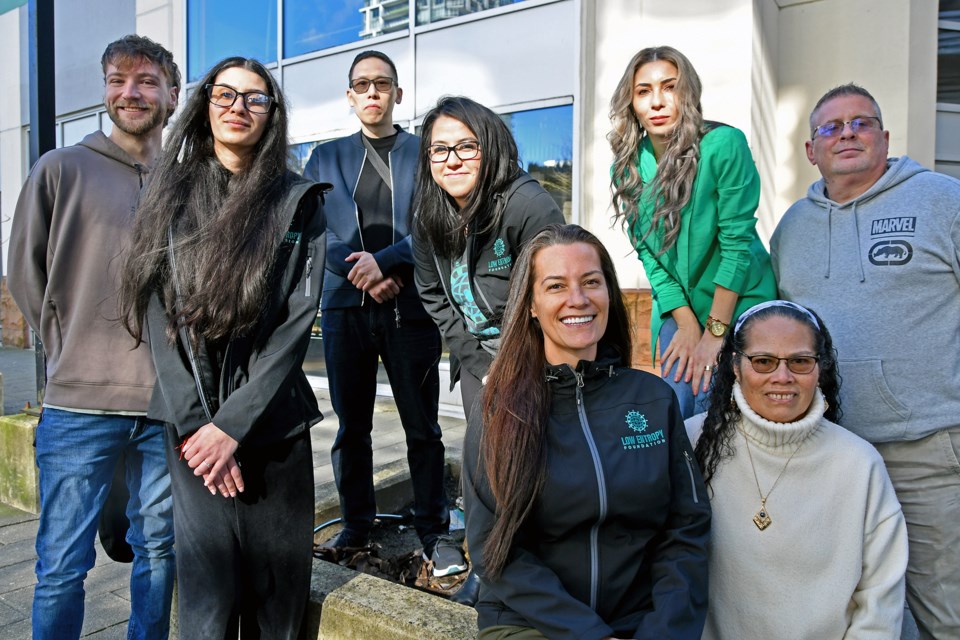Last November, Low Entropy got its first email from a woman experiencing homelessness.
"Help," it read.
"We are living in a tent, under a bridge, near the Coquitlam IKEA store."
The workers at the Coquitlam-based charitable foundation reached out to the woman and her boyfriend, a heroin drug user, to get them back on their feet.
Today, the woman is employed and temporarily housed while her boyfriend, who has been detoxing, has been sober for the past month.
That’s the success story Low Entropy tells as it begins to ramp up its homelessness outreach in the Tri-Cities.
This afternoon, Feb. 13, about two dozen leaders, frontline workers, volunteers and people with lived experiences from around the world joined the foundation at the Coquitlam Public Library to share their personal stories and to talk about why they want to help make a difference in a community where homelessness is largely hidden.
Currently, many of them are being trained on homelessness outreach through the foundation’s Empower Home initiative that includes co-executive director Vanessa Wideski; Natasha Cundy, director of outreach; and soon, Ed Hall, former chief of the Kwikwetlem First Nation.
Hall was at today’s meeting to offer a land acknowledgment and to talk about his hope for action locally: to connect with people, especially First Nations and Métis, who are unhoused in the Tri-Cities and to encourage others to make a difference, too.
On March 1, Low Entropy will host its first Tri-Cities Homelessness Community Forum at the City Centre library branch (1169 Pinetree Way, Coquitlam) to discuss challenges around homelessness and offer solutions.
Wideski wants the three mayors to be present — Coquitlam’s Richard Stewart, Brad West of Port Coquitlam and Meghan Lahti of Port Moody — to collaborate and give insights; the hour-long meeting starts at 11:45 a.m.
Wideski said the forum comes as a result of a community building session last year that drew about 50 people to identify gaps with social services.
“We heard the Tri-Cities was a desert for resources,” she told the Tri-City News after the meeting. “There are a lot of gaps: a lack of affordable housing, a lack for mental health supports and a lack of youth services.”
With a $25,000 grant from Sparc BC, the foundation dug deeper into the homelessness issues.
“Being action takers, we went back to the funder and asked if we could use the funding to create a program to help address the issue,” Wideski said. “Sparc BC agreed and here we are.”
Homeless deaths
According to B.C.’s Ministry of Public Safety and Solicitor General, 342 people experiencing homeless in the province died in 2022. A total of 82 per cent were men, and most died because they consumed illegal drugs.
For the ministry report, a person experiencing homelessness was defined as:
- someone living outdoors, in a make-shift shelter, a parked vehicle, a vacant home or any other structure not intended for habitation
- someone staying at an emergency shelter (overnight) or who is temporarily sheltered (suspected to be for less than 30 days) by friends or family, in a short-term shelter, safe house for youth or transition house for women and children fleeing violence
- someone residing in short-term shelters, safe houses or transition houses for an unknown length of time
The most impacted authorities in 2022 were Fraser Health at 32 per cent, which includes the Tri-Cities, followed by Vancouver Coastal at 24 per cent.
Some attendees at today’s Low Entropy meeting said they’re concerned about the lack of affordable housing in the area since the COVID-19 pandemic and the parallel rise of homelessness, especially among seniors, new Canadians and Indigenous people — some of whom are also struggling with mental health issues and/or drug addictions.
Wideski said many of them don’t want to go to the Tri-Cities only supportive housing hub, 3030 Gordon Ave. in Coquitlam, because “there are folks there who are using [drugs]. It’s not a viable solution.”
Tomorrow, Feb. 14, she and a peer sharing circle will be at 3030 Gordon Ave. with an Indigenous Elder to build relationships and bring hope.
“There are some really great people who are unhoused right now,” a Hope For Freedom outreach worker added.
“But we might not know by walking past them. They need connection. They need someone to help. A hand goes a long way in someone’s life.”





